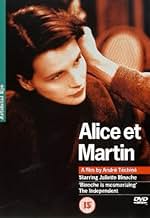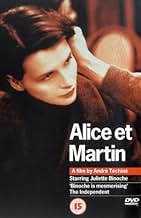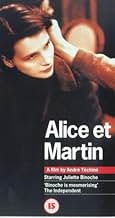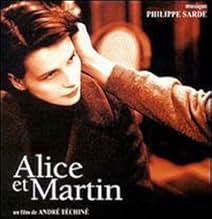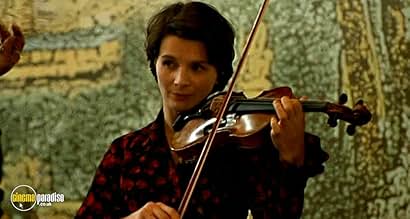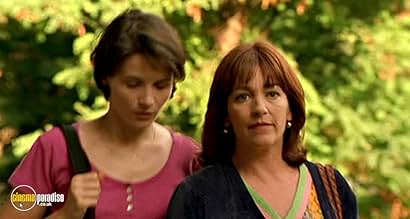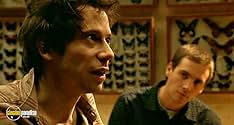A young man starts an affair with a woman - his brother's friend. Their relations are being tested because of obscure secrets hidden in the past.A young man starts an affair with a woman - his brother's friend. Their relations are being tested because of obscure secrets hidden in the past.A young man starts an affair with a woman - his brother's friend. Their relations are being tested because of obscure secrets hidden in the past.
- Director
- Writers
- Stars
- Director
- Writers
- All cast & crew
- Production, box office & more at IMDbPro
Featured reviews
Once a critic for Cahiers Du Cinéma, André Téchiné wakes generally high expectations from movie viewers, but he not always satisfied them. The interest for melodrama that distinguishes him from nouvelle vague predecessors returns in Alice and Martin which is not free from the thematic of dysfunctional family of others of his films. In this case the results are more unconvincing. At the beginning and for a long time we don't know what happens, and when we know, it does not matter enough. The disproportion between the elliptical and not few scenes of unnecessary diffuse dialogue does not contribute to go deep into the drama. Secondary characters like the tyrannical father, the mother, and the stepmother of the protagonist are delineated in the style of the stereotyped Spanish telenovela. The nicely photographed landscapes (a mark in Téchiné's pictures) add to the pleasure of the viewer but not fulfill the holes in the screenplay. The story, excessively charged with family quarrels, suicide, involuntary crime, tempestuous love, professional aspirations, madness, atonement, and final redemption, can't easily catch the spectator. Adam Gai
"Alice and Martin (Alice et Martin)" is the anti-Hollywood relationship movie of the summer. (It's French so you have to say it like you went to National Lampoon's famous School of ze French Akzent: "a-LEES ay mar-TAHN").
Act 1 gives you background on Martin growing up, yeah you think as you get restless, the usual dysfunctional family, the usual fights with dad, so he ends up in the big city.
Act 2 is the usual couple in the Big City (in this case, of course Paris) and quite a few people in the audience yawned quite loudly. There's a few sophisticated touches -- she's pals with gay guys, he falls into being a fashion model for the easy money (and the metaphor for his blankness) so there's arguments about commercialism.
This is my first Andre Techine film so I don't know if the crucial Act 3 is unusual, even though the central plot development was not a complete surprise.
So many Hollywood "meet cute, fall into bed, fight then realize they're made for each other" movies have the couple existing in a bubble, separate from family or the sources of how they got to be like they are. Here coming to terms with their souls means coming to terms with their family and seeing through all the implications. So there's a bit of a gimmick in cutting back and forth with flashbacks to reveal background to us, but it's done sort of like an amnesia victim gradually remembering.
Juliette Binoche really rises to the Act 3; I wasn't all that impressed with her in "The English Patient" but she's gut-wrenching here, going through very complex emotions--and nice non-Hollywood touch that she's the older of the pair.
If Hollywood were to remake this movie, they'd cut to the last 10 minutes, and turn it into a courtroom drama where the heroic defense lawyer goes around interviewing everyone to get to "the truth," but coming to peace with yourself is not something that litigation can solve, and Binoche's face shows that.
Nice repeat use of Jeff Buckley song.
(originally written 9/3/2000)
Act 1 gives you background on Martin growing up, yeah you think as you get restless, the usual dysfunctional family, the usual fights with dad, so he ends up in the big city.
Act 2 is the usual couple in the Big City (in this case, of course Paris) and quite a few people in the audience yawned quite loudly. There's a few sophisticated touches -- she's pals with gay guys, he falls into being a fashion model for the easy money (and the metaphor for his blankness) so there's arguments about commercialism.
This is my first Andre Techine film so I don't know if the crucial Act 3 is unusual, even though the central plot development was not a complete surprise.
So many Hollywood "meet cute, fall into bed, fight then realize they're made for each other" movies have the couple existing in a bubble, separate from family or the sources of how they got to be like they are. Here coming to terms with their souls means coming to terms with their family and seeing through all the implications. So there's a bit of a gimmick in cutting back and forth with flashbacks to reveal background to us, but it's done sort of like an amnesia victim gradually remembering.
Juliette Binoche really rises to the Act 3; I wasn't all that impressed with her in "The English Patient" but she's gut-wrenching here, going through very complex emotions--and nice non-Hollywood touch that she's the older of the pair.
If Hollywood were to remake this movie, they'd cut to the last 10 minutes, and turn it into a courtroom drama where the heroic defense lawyer goes around interviewing everyone to get to "the truth," but coming to peace with yourself is not something that litigation can solve, and Binoche's face shows that.
Nice repeat use of Jeff Buckley song.
(originally written 9/3/2000)
Andre Techine is a director that likes to portray the problems young people are facing, which seems what attracted him to "Alice et Martin", a film that gives us a strange take in how the past catches up with a young man that challenged his father's authority. The screen play is by Olivier Assayas and Gilles Taurand, two men that have had written better things for the cinema.
The film's opening sequence is puzzling since we have no clue as to what makes Martin run away from home. This seems to be a disjointed way to make the film work, because even though we might guess what could have happened, when the final truth comes about, we just don't care about it.
Then there is the problem of Alice's attraction for Martin. Alice is a woman that seems to know what she wants. She is older than the young guy that comes into her life, and should have been wiser to avoid, at all costs, but she falls for him, anyhow.
Basically, what attracted us to the film was Juliette Binoche, an actress that is always interesting to watch. Unfortunately, because our lack of interest in the story, we stop caring about her long before we get to know what really happened. Alexis Loret is a weak choice for Martin. Mathiew Amalric and Carmen Maura fare better in their supporting roles.
"Alice et Martin" is a slow moving film that will get in the nerves of viewers. Better luck to M. Techine in his next effort.
The film's opening sequence is puzzling since we have no clue as to what makes Martin run away from home. This seems to be a disjointed way to make the film work, because even though we might guess what could have happened, when the final truth comes about, we just don't care about it.
Then there is the problem of Alice's attraction for Martin. Alice is a woman that seems to know what she wants. She is older than the young guy that comes into her life, and should have been wiser to avoid, at all costs, but she falls for him, anyhow.
Basically, what attracted us to the film was Juliette Binoche, an actress that is always interesting to watch. Unfortunately, because our lack of interest in the story, we stop caring about her long before we get to know what really happened. Alexis Loret is a weak choice for Martin. Mathiew Amalric and Carmen Maura fare better in their supporting roles.
"Alice et Martin" is a slow moving film that will get in the nerves of viewers. Better luck to M. Techine in his next effort.
With Techine directing Binoche you would expect something special, something emotionally involving, something...good. But, sadly, this movie is, for the most part, disappointing. First of all we don't truly care about the characters, Loret, who plays Martin, is wooden and distant, and the blossoming relationship between the two leads is unconvincing. Binoche is on top form, a beauty to behold, but every time she's off the screen the film nosedives. Perhaps Alice's past should have been explored too. The psychological leash Victor has on Martin isn't tight enough to convincingly escalate into patricide. However, it isn't all bad. The cinematography is beautiful, in particular, when Martin opens his window, as a child, and is greeted by the snow falling. Golden Spain too. Alice Et Martin isn't diabolical, but with the talent involved, you would expect so much more. 6/10
A weirdly inconsistent film, mixing hamfisted direction with an occasional obsessive attention to telling detail, seemingly shallow interactions with deeper thoughts, and Juliette Binoche's acting with Alexis Loret's acting. Loret can't act at all, even though he is pretty. This is not a great French film, but there's a lot to like about it nonetheless. Juliette Binoche is in fact that pretty, and she can act too. It has some (but not all) of the unforced naturalness that distinguishes French cinema. And it does not look upon its audience as a bunch of slack-jawed troglodytes, always a plus. Seven of ten, not the thing to convince someone to enjoy French cinema but pleasurable nonetheless.
Did you know
Details
- Release date
- Countries of origin
- Official site
- Languages
- Also known as
- Alice và Martin
- Filming locations
- Production companies
- See more company credits at IMDbPro
Box office
- Gross US & Canada
- $500,896
- Gross worldwide
- $500,896
- Runtime
- 2h 4m(124 min)
- Color
- Sound mix
- Aspect ratio
- 1.66 : 1
Contribute to this page
Suggest an edit or add missing content


